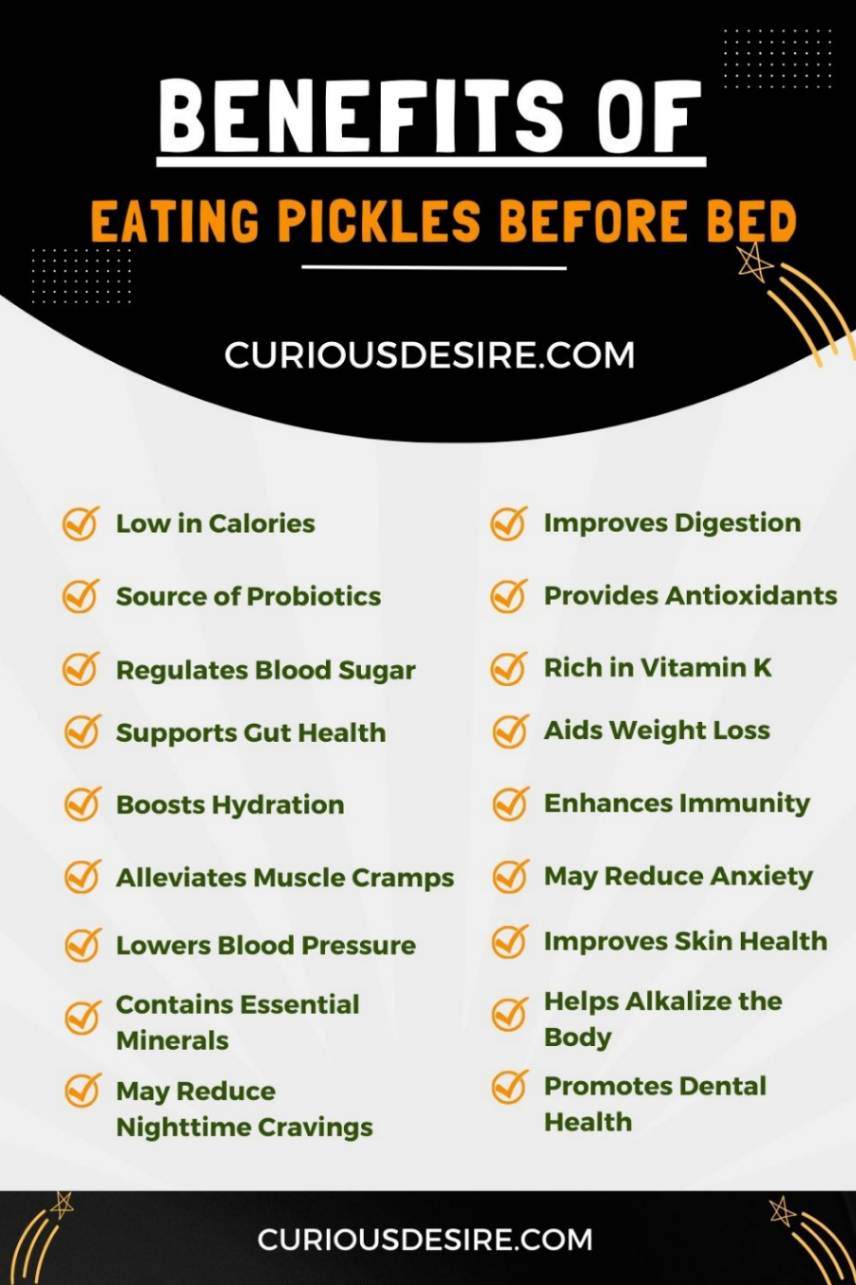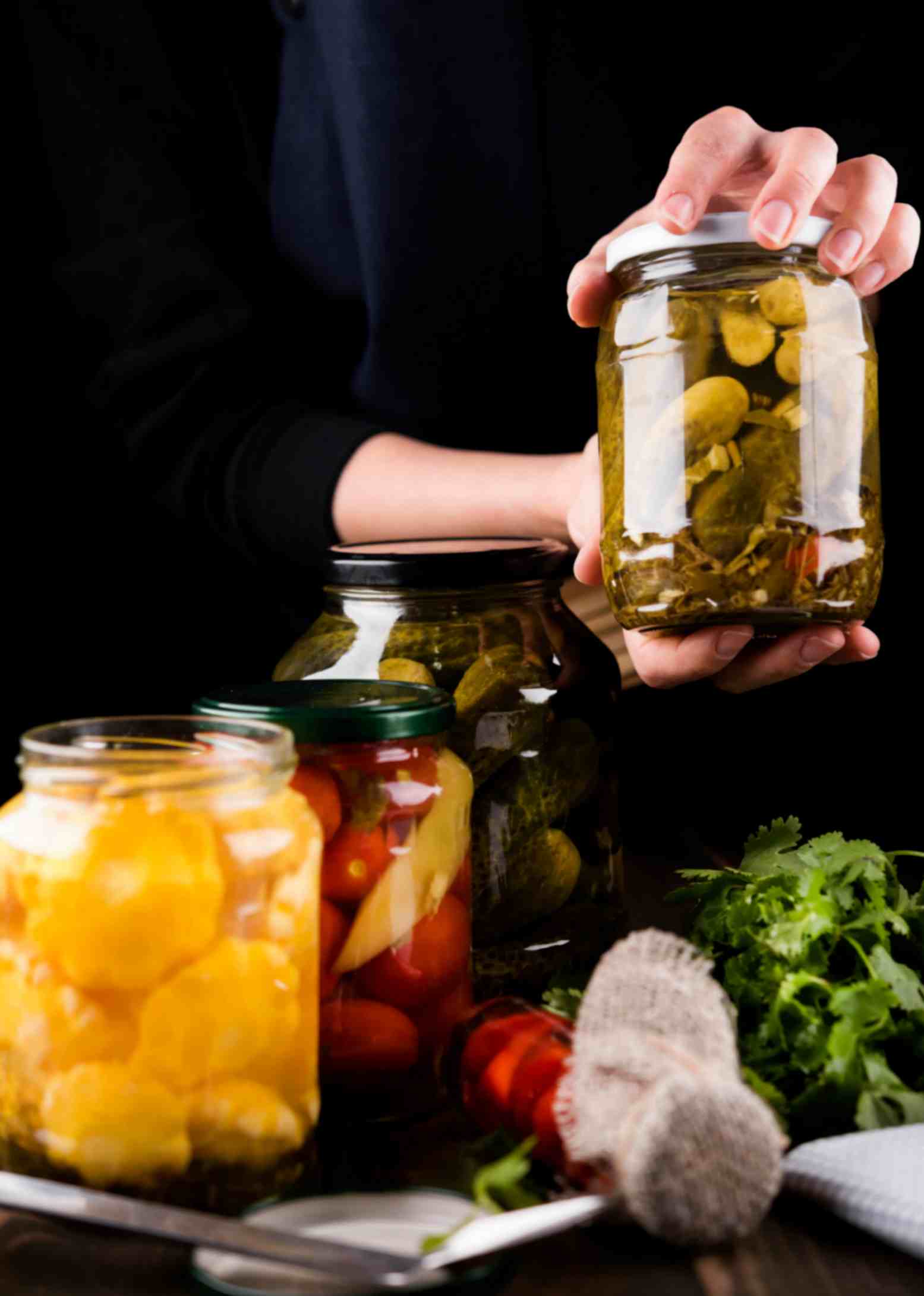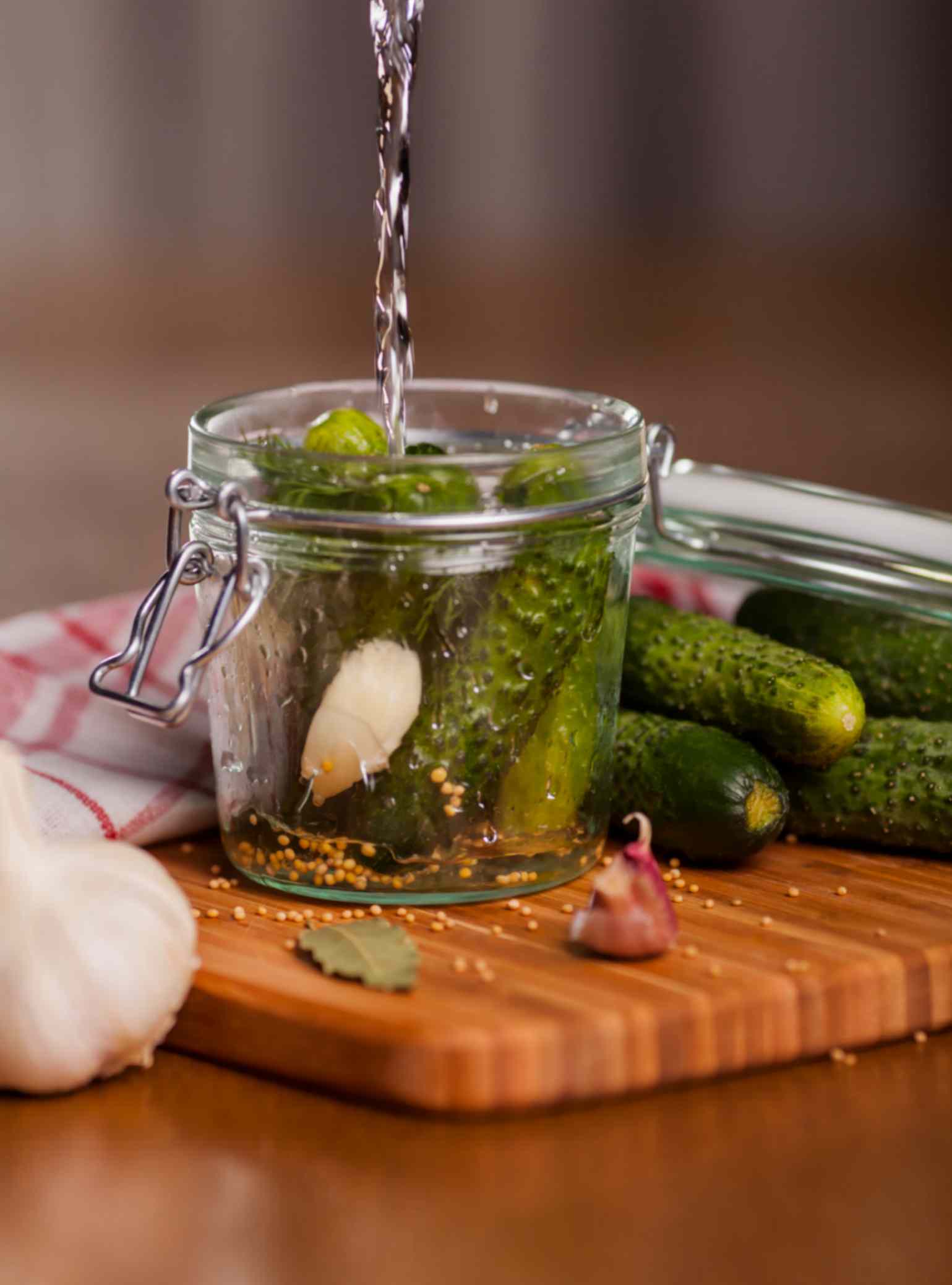Here are the 5 most common benefits of eating pickles before bed
- Low in Calories
- Source of Probiotics
- Improves Digestion
- Regulates Blood Sugar
- Provides Antioxidant
Benefit 1: Low in Calories
Pickles are a low-calorie snack due to their minimal fat and carbohydrate content. Studies suggest that a diet low in calories may contribute to weight management and overall health.
Consuming low-calorie foods can help regulate energy intake, potentially leading to weight loss.
This is supported by research indicating a link between calorie restriction and improved metabolic markers, such as reduced blood pressure and improved cholesterol levels.
Additionally, incorporating low-calorie options like pickles into one’s diet may be beneficial for those aiming to maintain a healthy weight.
By choosing snacks that are low in calories, individuals can create a calorie deficit, supporting weight loss goals over time.
Benefit 2: Source of Probiotics
Pickles, especially those fermented in brine, are rich in probiotics, which are beneficial bacteria known to enhance gut health.
Scientific studies highlight the role of probiotics in promoting a balanced gut microbiota, contributing to improved digestion and a strengthened immune system.
The presence of probiotics in pickles may positively influence the microbial composition in the digestive tract, helping in the breakdown of food and absorption of nutrients.
Furthermore, a healthy gut microbiome has various health benefits, including reduced inflammation and enhanced immune function.
Regular consumption of pickles as a source of probiotics can help maintain a healthy gut microbiota and contribute to overall well-being.
Benefit 3: Improves Digestion
Pickles contain vinegar, which is a key ingredient that can help in digestion. Acetic acid, present in vinegar, may help break down food in the stomach, facilitating the digestive process.
Studies have suggested that the consumption of vinegar before meals may improve digestion by increasing stomach acid production.
Improved digestion can lead to better nutrient absorption and may reduce common digestive discomforts.
For instance, a small amount of pickle juice before a meal might enhance gastric function, making it easier for the body to process and absorb nutrients.
This can be particularly beneficial for individuals with digestive issues or those looking to optimize their health.
Benefit 4: Regulates Blood Sugar
The inclusion of pickles in a balanced diet may contribute to better blood sugar regulation. Some research indicates that vinegar, a common component in pickling solutions, may have a positive impact on insulin sensitivity.
Consuming pickles, especially those made with vinegar, could potentially help manage blood sugar levels, reducing the risk of insulin resistance.
For example, a study has shown that vinegar consumption with a high-carbohydrate meal resulted in lower post-meal blood sugar levels.
Including pickles as part of a meal may be a simple and tasty way to support blood sugar control, making them a favorable choice for individuals with diabetes or those concerned about blood sugar fluctuations.
Benefit 5: Provides Antioxidants
Pickles, particularly those made from vegetables, are rich in antioxidants, which play an important role in neutralizing harmful free radicals in the body.
Antioxidants help protect cells from oxidative stress, which is linked to various chronic diseases and aging.
Studies have shown that a diet high in antioxidants may contribute to a reduced risk of conditions such as heart disease and certain cancers.
For instance, pickled cucumbers contain compounds like flavonoids and carotenoids with antioxidant properties.
Regularly consuming pickles may enhance their antioxidant intake, potentially supporting overall health and providing a defense against oxidative damage.
Benefit 6: Supports Gut Health
The probiotics found in pickles contribute to a healthy gut microbiome.
Research has found that a balanced and diverse gut microbiota is important for various aspects of health, including immune function, mental well-being, and inflammation regulation.
Incorporating pickles into the diet can promote the growth of beneficial bacteria in the gut, positively influencing its microbial composition.
For example, studies suggest that probiotics in pickles may help reduce symptoms of irritable bowel syndrome (IBS) and enhance bowel regularity.
By promoting a healthy gut microbiota, pickles can contribute to digestive comfort and support overall gut health.
Benefit 7: Rich in Vitamin K
Pickles, particularly those made from fermented vegetables, are a good source of vitamin K. This fat-soluble vitamin plays a crucial role in blood clotting and bone health.
Research has shown that an adequate intake of vitamin K is associated with a reduced risk of fractures and improved bone density.
For instance, pickled cabbage is not only a tasty addition to meals but also provides vitamin K, contributing to the maintenance of strong and healthy bones.
Including pickles in the diet can be a convenient way to boost vitamin K levels and support bone health, especially for individuals who may have difficulty obtaining sufficient vitamin K from other sources.
Benefit 8: Aids Weight Loss
The low-calorie content of pickles, combined with their satisfying flavor, can be advantageous for individuals aiming to lose weight.
Studies have suggested that incorporating low-calorie foods into the diet can help create a calorie deficit, promoting weight loss over time.
The crunch and tanginess of pickles can also add a satisfying element to meals without significantly increasing calorie intake.
For example, including pickles as a snack option may contribute to feelings of fullness and satisfaction, reducing the likelihood of overeating.
This makes pickles a potentially helpful addition to weight management strategies, providing a flavorful and low-calorie alternative to more calorie-dense snacks.
Benefit 9: Boosts Hydration
Pickles, especially when made with cucumbers, are a hydrating food option due to their high water content.
Staying well-hydrated is important for various bodily functions, including temperature regulation, joint lubrication, and nutrient transportation.
Research has emphasized the importance of both water intake and water-rich foods in maintaining proper hydration levels.
For example, pickled cucumbers can contribute to overall fluid intake, supporting hydration alongside other beverages.
Including hydrating foods like pickles in the diet can be particularly beneficial for individuals who may struggle to meet their daily fluid needs through beverages alone.
Benefit 10: Enhances Immunity
The probiotics found in pickles play a role in supporting immune function. Research suggests that a healthy gut microbiome is closely linked to a robust immune system.
Probiotics may enhance the production of antibodies and promote the activity of immune cells, helping the body defend against infections and illnesses.
For instance, studies have indicated that probiotics in pickles may contribute to a reduction in the duration and severity of respiratory infections.
By supporting immune health, regular consumption of pickles can be a tasty and convenient way to strengthen the body’s natural defense mechanisms.
Benefit 11: Alleviates Muscle Cramps
Pickle juice, in particular, has been explored for its potential to reduce muscle cramps.
Research indicates that the combination of electrolytes and acetic acid in pickle juice may help prevent and relieve muscle cramps, especially during intense physical activity.
For example, athletes and individuals engaging in intense exercise may benefit from consuming pickle juice as a natural remedy for muscle cramps.
The electrolytes in pickle juice, such as sodium and potassium, play an important role in maintaining fluid balance and muscle function, contributing to reduced cramp occurrence.
Benefit 12: Lowers Blood Pressure
The acetic acid in pickles, especially those made with vinegar, may contribute to blood pressure regulation. Studies have suggested that vinegar consumption can lead to a modest reduction in blood pressure levels.
This effect may be due to acetic acid’s ability to relax blood vessels and improve endothelial function.
For example, incorporating pickles into a heart-healthy diet may be a flavorful way to complement lifestyle measures aimed at managing blood pressure.
While not a substitute for prescribed medications, including pickles can be part of a comprehensive approach to maintaining cardiovascular health.
Benefit 13: May Reduce Anxiety
The gut-brain connection is an emerging area of research, and the role of probiotics in influencing mental well-being is being explored.
Some studies suggest that the gut microbiota, influenced by probiotics in foods like pickles, may play a role in regulating mood and reducing anxiety.
For example, individuals experiencing stress or anxiety may find that incorporating probiotic-rich foods, such as pickles, into their diet positively impacts their mental state.
Benefit 14: Improves Skin Health
Antioxidants in pickles, such as vitamin C and beta-carotene, contribute to skin health by neutralizing free radicals and supporting collagen production.
Collagen is important for maintaining skin elasticity and preventing signs of aging, such as wrinkles. For example, pickled carrots, rich in beta-carotene, can contribute to the body’s antioxidant defenses and promote healthy skin.
Benefit 15: Contains Essential Minerals
Pickles, depending on the ingredients used, can be a source of important minerals such as potassium, calcium, and magnesium. These minerals play important roles in maintaining various bodily functions.
Potassium, for example, is important for heart health and helps regulate blood pressure. Calcium is important for bone health, while magnesium contributes to muscle and nerve function.
For example, pickles made with ingredients like kale or mustard greens can provide a mineral boost.
Including mineral-rich pickles in the diet can support overall health by ensuring the body receives an adequate supply of important minerals necessary for optimal functioning.
Benefit 16: May Reduce Nighttime Cravings
The low-calorie and flavorful nature of pickles can be a beneficial addition to the evening routine, potentially helping reduce nighttime cravings for less healthy snacks.
Research suggests that the crunchiness and tanginess of pickles may satisfy taste cravings without adding excessive calories, making them a suitable alternative to high-calorie snacks before bedtime.
For example, For those who tend to snack late at night, a few pickles can be a satisfying and healthy option.
An effective way to manage weight is by controlling nighttime cravings using low-calorie snacks, such as pickles, which can also promote healthier dietary habits.
Benefit 17: Helps Alkalize the Body
Pickles, particularly those made with alkaline-forming vegetables, may contribute to the body’s acid-alkaline balance. While the body naturally regulates its pH levels, some foods can influence this balance.
Alkaline-forming foods, like certain pickles, may help counteract the acidity resulting from a diet high in processed foods and animal products.
For example, pickled radishes or cucumbers can have alkalizing effects on the body.
Including such pickles in the diet may be part of a strategy to promote a more alkaline environment, potentially benefiting overall health and reducing the risk of conditions associated with excessive acidity.
Benefit 18: Promotes Dental Health
Pickles, especially those made from crunchy vegetables, can promote dental health.
The natural chewing involved in eating pickles stimulates saliva production, which helps neutralize acids and maintain a healthy pH level in the mouth. This process helps in preventing tooth decay and cavities.
For example, the act of chewing pickles can help remove food particles from teeth, promoting better oral hygiene.
Including pickles as a part of your diet can be a simple and enjoyable way to support dental health, complementing regular oral care practices like brushing and flossing.
Pickles on the Plate: A Quick Guide to Nutritional Facts
Ever wondered about what’s packed into those tangy bites of pickles? Let’s break down the nutritional facts, calories, and sugar content. In this simple guide, discover the key details about everyone’s favorite crunchy snack.
| Nutritional Element | Quantity per 1 Medium Pickle (about 35g) |
|---|---|
| Calories | Approximately 5-10 calories |
| Fat | Around 0 grams |
| Sugar | Typically less than 1 gram |
| Carbohydrates | Roughly 1-2 grams |
| Fiber | About 0 grams |
| Protein | Around 0 grams |
| Potassium | Around 46 mg |
| Calcium | Roughly 3 mg |
| Magnesium | About 3 mg |
| Vitamin C | Approximately 0.5 mg |
Late-Night Munching: Disadvantages and Risks of Eating Pickles Before Bed
Eating pickles before bedtime, while offering several potential health benefits, may also come with certain disadvantages that demand consideration.
While pickles can be a flavorful and crunchy addition to your diet, it’s important to be mindful of potential drawbacks, particularly when consumed close to bedtime.
In this exploration, we uncover the potential disadvantages of bedtime pickle munching, offering insights for a smart and informed approach to your late-night snacking.
- High Sodium Content: Pickles are often high in sodium, and consuming them before bed may contribute to an increased sodium intake, potentially leading to bloating and water retention.
- Disruptive to Sleep: The acidity in pickles, especially if consumed in large quantities, may cause acid reflux or indigestion, potentially disrupting sleep and causing discomfort.
- Dehydration Risk: Despite their hydrating nature, the high sodium content in pickles may counteract their hydrating effects, potentially contributing to dehydration, especially if water intake is not sufficient.
- Potential for Elevated Blood Pressure: Excessive sodium intake, especially before bedtime, may lead to a temporary increase in blood pressure, which can be a concern for individuals with hypertension or cardiovascular issues.
- Impact on Dental Health: The acidity and crunchiness of pickles may pose a risk to dental health, as the acid can erode tooth enamel, and the abrasive texture may contribute to enamel wear.
- Caloric Considerations: While pickles are generally low in calories if consumed in large quantities, the calories can add up, potentially affecting weight management goals if not accounted for within overall daily caloric intake.




